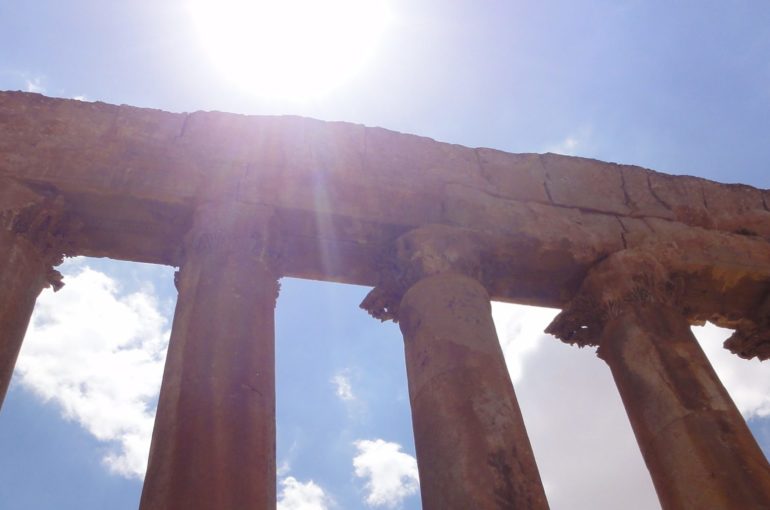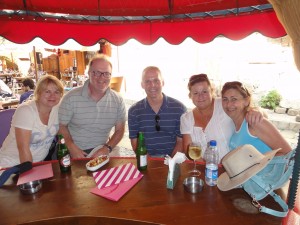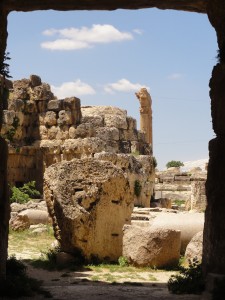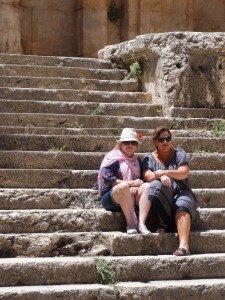Coming face-to-face with Lebanese immigration

Lebanese immigration officials may not like passports stamped in Israel, but the rest of the population is welcoming
THE Lebanese immigration officer’s hand was hovering over my wife’s passport.
He was just about to stamp it when he stopped, looked up and said that we needed to follow him to the little room on the left.
The problem – my wife’s passport had a stamp in it from a previous trip to Israel.
The Israeli officials at Ben Gurion Airport had stamped it, despite being asked not to. Thankfully, they didn’t stamp mine.
We were now trying to enter Lebanon as part of a trip that also involved visits to Oman and Cyprus, but soon discovered that travel and politics don’t mix well in this part of the world.
“You have been to Palestine?” were the first words to come from the Lebanese immigration officer sitting behind the big desk in the room.
My wife chirped back, sparkling all her cuteness, and confident that honesty was the best policy: “No, we were in Israel last week.”
“Not possible,” he barked. “Israel does not exist.”
Oh, poo! On the surface I remained calm, but inside I was thinking that we were about to be shuffled off on the next plane out of Beirut or star in Lebanon’s version of that tacky TV show Border Security.
Questions, questions and even more questions
The Lebanese immigration officer asked about another dozen rapid-fire questions and then the room fell silent for almost two minutes. It seemed much longer. His three Lebanese immigration colleagues watched him and glared at us.
Then he gave my wife a pink form, told her she must keep it with her at all times and pointed to the door.
Thankfully first impressions aren’t always the best.
About an hour later we arrived at the Four Seasons Hotel to a polar opposite welcome. Our car was met by water-carrying bellboys who already had our check-in documents and escorted us straight to our room, which had views over the waterfront. The Four Seasons, on Professor Wafic Sinno Ave, is right in the heart of the swish part of Beirut. Built in 2005, the 230-room hotel, designed by Pierre-Yves Rochon, is arguably Beirut’s best.
From the rooftop lounge to the modern downstairs bar, it is a striking statement about how Beirut, perhaps more than Lebanon, has changed to become a true world-class city.
After years of conflict, Beirut is being redeveloped at a rapid rate. And that is no more obvious than the area surrounding the hotel.
Within walking distance you will find Gucci, Marc Jacobs, Dior, Prada and Chanel stores wedged between shops selling $250,000 carpets and other stores, not car yards but shops, offering the latest Porsche for sale.
There is no shortage of obvious wealth here. Ten years ago, this area around Zaitunay Bay was dead. During the 15-year Lebanese civil war (1975-1990), this part of the city was used as a dumping ground.
Ready to party
Today, it is a shining example of how Lebanon has survived conflict and is now ready to party.
Sitting in Zabad, a restaurant serving Lebanese food with a modern twist, I asked Joseph Younes, a fellow traveller from Sydney’s inner-west who joined us for dinner, what he liked best about the country of his forefathers.
“Lebanon is never boring. The food is never boring; the people are never boring; and the list of things to do and see is never boring,” he said.
“While most international cuisine is offered (such as seeing an Indian restaurant or steakhouse in Zaitunay Bay), I like eating Lebanese when in Lebanon. For whatever reason, the flavours and ingredients used here give it just that little extra kick and make it tastier when compared to eating Lebanese in Australia.
“The people are never boring and make for good company. Whether chatting to cab drivers or joining friends and family for dinner, everyone it seems has an opinion, about everything.
“Finally, I like Lebanon as there is always something to do. You can check out Roman ruins, Crusader castles, beach resorts, small bars and lively nightclubs any day or night of the week.”
Younes is spot-on when he says that the Lebanese have an opinion about everything.
We were travelling with TV celebrity and book guru Cheryl Akle and spent time dining and drinking with her extended family.
They flitted between three languages English, French and Arabic fluently. No subject was off limits. The conversation was loud and the laughter raucous.
Plastic surgeons are making a fortune
One of Akle’s cousins points out a woman with surgical plaster on her nose. “That’s the Beirut nose. Just about every young woman in Beirut has had some form of cosmetic surgery,” she says. “The banks even offer loans for cosmetic surgery. It is on the billboards. You shouldn’t have to wait for the important things in life,” she said tilting her head to blow smoke away from the table.
The conversation then turns to cigarettes. They argue, one puff at a time, that there is no evidence to suggest that smoking is harmful. Any protest is useless.
Next stop politics and religion. It appears that danger does not deter the people of Beirut. This is their country. This is their life and they intend to live it the way they choose.
They are masters of their own destiny, afraid of nothing.
Beirut’s brutal history is never too far from view, though.
Beirut is often referred to as the Paris of the East. And it is easy to understand why as you twist and turn through the city’s narrow streets to climb high to take in the view.
But on that journey you will see buildings riddled with bullet holes from the years of conflict. I think that conflict plays a huge part in why Beirut’s inhabitants live for today, because they know there may be no tomorrow.
We had four days in Beirut so allowed two days to see the city and another two to explore some of the countryside. We hired a driver – it did help that Akle could speak Arabic – and headed out to the Bekaa Valley, along the Syrian border, to see the ancient Roman ruins of Baalbek.
The magic of Baalbek
This is a masterpiece, and definitely worth the drive. The temples to Bacchus, Jupiter and Venus are treasures of design and architecture.
You can wander for hours, but try to take time to just sit and imagine what life would have been like here during the peak of Roman rule.
The morning after we returned from Bekaa, The Daily Star, the local newspaper, splashed with a story about new Hezbollah bases being spotted in the region. It goes to show that trouble is never far away in this part of the world. Which brings me to our exit from Lebanon.
My wife and I went down different immigration paths leaving the country. I was let through, she was halted and this time taken off to the room on the right.
She made it home safely.
Eating there
The iconic restaurant Adghal in Feytroun, a suburb just 12km from the city, is well worth the trip. The food is traditional Lebanese cuisine. The owner is eccentric, to say the least, and it is fair to say that this restaurant is like no other I have visited.
Main Rd, Feytroun


